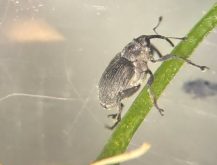Monsanto’s new glyphosate- and dicamba-tolerant “Xtend” soybeans will give farmers better weed control, higher yields and delay the onset of glyphosate-resistant weeds, company officials told agronomists and reporters here June 23.
And if China approves their import, North American farmers, including in Manitoba, will be planting Xtend soybeans next spring, said Pat Comte, Monsanto’s strategic account manager.
“This is going to be the largest launch of a trait in our company history,” he said.
Stacking a dicamba-tolerant gene with glyphosate (Roundup) tolerance will make it easier for soybean growers to control more weeds with one spray application, including some glyphosate-resistant weeds. It provides 14 days of residual weed control and delays the development of herbicide-tolerant weeds, said Bruce Murray, Dekalb’s agronomist for southeastern Manitoba. (Dekalb is Monsanto’s seed company.)
Read Also

Trade uncertainty, tariffs weigh on Canadian beef sector as market access shifts
Manitoba’s beef cattle producers heard more about the growing uncertainty they face as U.S. tariffs, and shifting trade opportunities, reshape their market.
“Probably the best thing we can do (to delay herbicide-resistant weeds) is tank mix,” Murray said. “We always take the easy way out. We’ve got to stop taking the easy way out. Tank mixes are probably the best thing you can do to slow resistance that you actually have some control over.”
Weed experts agree. Applying herbicides with two different “modes of action” to kill weeds reduces the chance of selecting naturally herbicide-resistant ones. If one herbicide doesn’t kill the weed hopefully the other does.
Each mode of action is numbered. Glyphosate is in Group 9 and dicamba is in Group 4.
With repeated use, however, there’s a risk of selecting weeds that are resistant to glyphosate and dicamba. That’s why Monsanto recommends applying glyphosate (Weathermax) and dicamba (Xtendimax) pre-plant to the V2 soybean stage to get early weed control, resulting in potentially higher yields. If a second application is required in-crop farmers can substitute dicamba with one of several other herbicides such as Viper or Odyssey, which will control glyphosate-tolerant canola.
“You want to start clean and stay clean,” Dekalb agronomist Danielle Berard said. “This is where your herbicide dollars are going to be most effective. Soybeans are a wimp. They don’t tolerate competition very well so you want to apply it earlier on in the season.”
Weed scientists, including Agriculture and Agri-Food Canada’s Hugh Beckie, also recommend crop rotation, including fall-seeded and perennial crops, avoiding herbicide use when possible and rotating herbicides, as ways to delay herbicide-resistant weeds.
In an interview last year Beckie said tank mixing herbicides with two different modes of action was a good strategy for delaying the development of glyphosate-resistant kochia, which is widespread in Alberta and Saskatchewan.
“Farmers were just using glyphosate alone at high rates and that quickly selected for resistance,” he said. “They should be tank mixing another mode of action whenever possible with glyphosate and to only spray glyphosate when it’s really needed…”
A survey of 283 Manitoba fields last year found only two had glyphosate-resistant kochia.
Murray is optimistic Xtend soybeans will help keep the numbers low.
Xtend soybeans, on average, outyield Roundup Ready 2 Yield varieties by 2.4 bushels an acre mainly because of improved early weed control, Murray said. Dicamba is providing better residual weed control than expected, he added.
That persistence means non-Xtend soybeans can’t be reseeded in a treated field the same season dicamba was applied.
Xtend soybeans have been registered for some time in Canada. China is the last major soybean importer to approve the new genetically modified varieties, but is expected to do so before year’s end, Comte said.
In the meantime, Xtend soybean seed is being produced for 2016 planting, Comte said.
Monsanto is also working quickly to make its future soybeans glyphosate and dicamba tolerant.
The company is also developing glyphosate- and dicamba-tolerant corn and canola.
“Whether we like it or not we aren’t going to get too many new herbicides,” Murray said. “It just hasn’t been happening. It has been a long time since we’ve had a new mode of action. The way we’re going to get smart about this is we’re going to have to look at traits at least for a while.”
Dow AgroSciences has developed crops that tolerate glyphosate and 2,4-D.
















